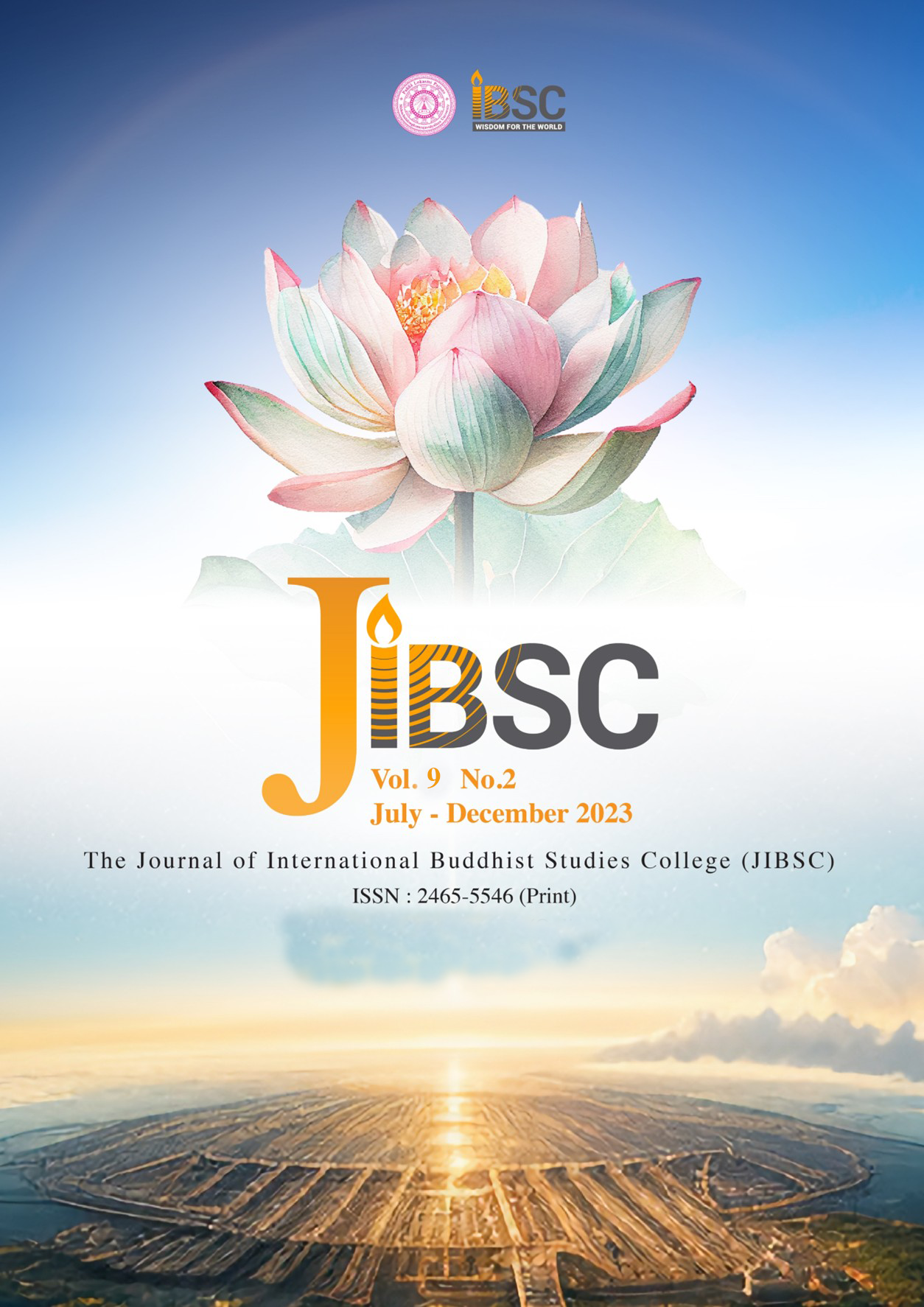The Best Ways to Manage Anger in accordance with the Buddhist Perspective
Main Article Content
Abstract
There exist three fundamental roots of issues within our existence. These roots are identified as greed, hatred, and delusion, which serve as the foundation of unwholesome kamma. Consequently, the emergence of these unfavorable actions and challenges can be directly attributed to the presence of greed, hatred, and delusion. The state of greed, along with that of hatred, is consistently accompanied by a veil of ignorance or delusion. The subject matter being addressed in this particular piece pertains to the effective Management of Anger. Accordingly, I shall delineate various strategies aimed at managing and diminishing feelings of anger. Within the realm of Buddhism, a plethora of methodologies exist for the purpose of managing and eradicating Dosa-anger, which constitutes one of the Cetasikas among the 14 unwholesome mental factors that are intricately linked with the 12 categories of unwholesome Cittas, serving the needs of both individuals and society at large who harbor a desire to evade problems, adversities, tensions, anxieties, and apprehensions. The article is structured into three distinct sections; namely the examination of the essence of anger, the exploration of its underlying causes, and the presentation of strategies for anger management, thereby encapsulating the primary objective of this article, which is to foster a comprehensive understanding of the intrinsic nature, causal factors, and effective management techniques related to anger, thereby prompting both individuals and society, regardless of religious affiliation, to exercise a discerning eye towards achieving the desired quality of life. It has come to our attention that the strategies outlined within this article, in conjunction with those previously mentioned, are in alignment with the Buddhist teachings on anger management, notwithstanding our collective aspiration to manifest an existence reflective of an ideal state.
Article Details
The Journal of TCI is licensed under a Creative Commons Attribution-NonCommercial-NoDerivatives 4.0 International (CC BY-NC-ND 4.0) licence unless otherwise stated. Please read our Policies page for more information on Open Access, copyright and permissions.
References
A New Translation of the Majjhima Nikaya. Kandy, Srilanka: BPS, 1995.
Abeysekera, Radhika, Questions &Answers in Buddhism, Vol.II, Canada: Dhammadenna.com, 2001.
“Control Anger Before It Controls You”, November 27, 2021. https://www.apa.org/topics/ anger/control.
Davids, T.W. Rhys. Dialogues of the Buddha (Digha Nikaya), Oxford, 1910.
Davids, T.W. Rhys, and W. Stede (ed.). The pāli Text Society’s pāli-English Dictionary. Londaon: PTS, 1979.
Dhammapada Aṭṭhakathā, Norman, H. C. (ed.), The Commentary on the Dhammapada, London: Luzac & Company, Ltd., 1970.
Hare, E. M. (tr.). Aṅguttara Nikāya: The Gradual Sayings. Oxford: PTS, 1995.
Horner, I.B. (tr.). Majjhima Nikāya: The Middle Length Sayings. Oxford: PTS, 1995.
Horner, I.B. (Tr.). The Book of the Discipline (Vināya-Piṭaka). Vol. II. (Pācittiya). Oxford: PTS, 1997.
Mahāthera Nārada. A Manual of Abhidhamma, 1st ed., Kuala Lumpur: Buddhist Missionary Society, 1956.
Meditation for Anger: Escaping the cage of anger through Meditation, (Online). Source <https://betterme.world/articles/meditation-for-anger/#What_Is_Anger> (27, November, 2021).
Ñāṇamoli Bhikkhu (tr.), The Path of Discrimination (Patisambhidā-magga), Kandy: PTS, 2014.
Ñāṇamoli Bhikkhu, (tr.), The Path of Purification (Visuddhimagga), Kandy: BPS, 2010.
Ñānamoli, Bhikkhu and Bodhi Bhikkhu. The Middle-Length Discourse of the Buddha,
Nyānaponika Thera, The Roots of Good and Evil, Kandy, Sri Lanka: BPS, 1986.
R.L. Soni, Life’s Highest Blessings, Mahā Maṅgalasutta, Kandy, Sri Lanka: BPS, 1956.


